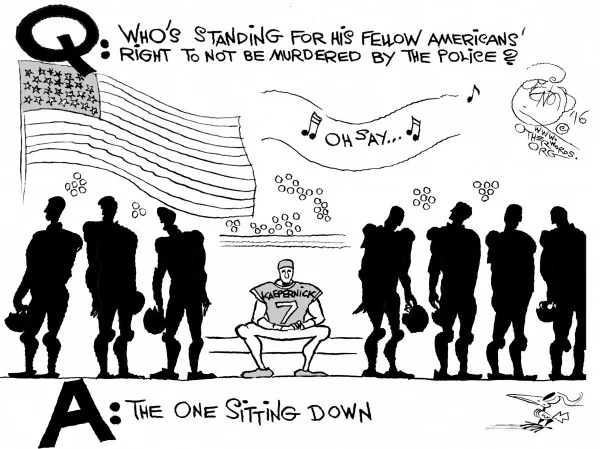Jill Richardson: Whites should consider what it's like being black
Via OtherWords.org
As white people across the nation criticize Colin Kaepernick and other NFL players who “take a knee” for the national anthem, they ought to know something first.
White people in America have no idea what life is like for black people in America.
How can I make such a broad statement? How would I possibly know?
For one thing, I’m white. I grew up in a mostly white town. Like many white people, I was raised to oppose racism, at least as I understood it then. I celebrated Rosa Parks and Martin Luther King, Jr.
I wasn’t quite sure who Malcolm X was — I’d heard the name, but we never studied him in school. I’d never heard of other black leaders like Marcus Garvey or Bayard Rustin.
I never used the N-word. I wouldn’t even write it in my essay on Huckleberry Finn in ninth grade English. And I’d never even heard of most other racial slurs for African Americans — or any other race for that matter. Nobody used language like that.
But that was the extent of my background when, three years ago, I found myself assigned to be a teaching assistant in a sociology class on race. The professor would give the lectures; I would lead the discussions.
To say it was terrifying is an understatement. I didn’t know any of the material I now had to teach, and I was flying by the seat of my pants.
Fortunately, I did know how to listen. And I know how to empathize.
In the years since, I’ve taught hundreds of students of all races — first as a teaching assistant and now as an adjunct professor.
And it’s funny. When you start listening, you learn things.
I learned that being black in America means people who aren’t black think it’s OK to touch your hair whenever they want — often without asking, even if they don’t know you.
When my students inadvertently made racist remarks, it didn’t hurt me as a white person. If I weren’t white, it would’ve stung. And I would’ve had to remain cool and professional while continuing to do my job — something I learned nonwhite people have to do all the time.
I learned that decades of housing discrimination robbed black people of wealth as most whites bought homes and built equity. The effects of those disparities live on.
Long after segregation was legal, we continue to live in racially segregated neighborhoods, and students like Michael Brown attend schools so poor I couldn’t even fathom that such a place would be called a school.
How can anyone succeed in college or find a good job if they barely even have one class a day where a teacher shows up and teaches using, as was the case in a district detailed in a 2015, This American Life, the NPR show?
Each year, I face the same conundrum: My students inhabit different worlds. The white students think that they know all there is to know about life in America. My job is to gently show them they have no idea — as I had no idea — what it’s like not to be white in America.
I can’t speak for black people, and I wouldn’t try to. They speak very well for themselves. I’ll just say that those of us who are white should listen when they do.
And to do that, white people must overcome their defensiveness. Not every protest against racism is a personal attack against them, the flag, the country, or whatever else.
So if you’re white, next time you see black football players take a knee and don’t understand, take it as a sign you have something to learn.
Jill Richardson is an OtherWords,org columnist.
